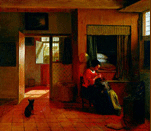










Bernadette
Andrea
Assistant Professor of English
University of Texas at San Antonio
At the climax of Philip Massinger’s tragicomedy The Renegado (1630),
the formerly exemplary Christian European heroine, Paulina, who has hitherto
resisted assaults both to her chastity and her religion, finally declares
that she “will turn Turk” (331, 5.3.152). Strikingly, her declaration
is met not with disbelief by the Christians in attendance, but with a grim
recognition that, to evoke Shakespeare’s Othello, women are bound to
“turn, and turn; and yet go on/ And turn again” (IV.i.253-54).
The huckster Gazet encapsulates this response in his aside, “Most of
your tribe do so/ When they begin in whore” (331, 5.3.152-53), which
he reinforces with the invective, “That’s ever the subscription/
To a damned whore’s false epistle” (332, 5.3.158-59). Though dramatic
irony allows the viewer to temper Gazet’s crude misogyny with the knowledge
that Paulina merely poses as a renegade to redeem her captive brother and
his newly converted betrothed, the Turkish princess Donusa, this specifically
gendered connotation of conversion resonates from the beginning of the play
for all its female characters, Christian and Muslim.
The “renegade” as an index of Islam’s allure for early modern Europeans has recently been highlighted by a number of critics seeking to challenge the transhistorical application of Edward’s Said Orientalism to the English Renaissance. Nabil Matar, at the crest of this second wave of attention to Islam and England during the Renaissance (to cite the subtitle of Samuel Chew’s The Crescent and the Rose, the still relevant foundational text for the first wave in this field), draws on early modern sources to identify a “renegado” as “one that first was a Christian, and afterwards becommeth a Turke” (“‘Turning Turk’: Conversion to Islam in English Renaissance Thought,” 34). In his extended study of Islam in Britain, 1558-1685, Matar further demonstrates that, contra post-colonial anachronisms, during the early modern period “Britain did not enjoy military or industrial power over Islamic countries. Rather, the Muslims had a power of self-representation which English writers knew they had either to confont or to engage” (11-12). Working within the disciplinary framework of Ottoman Studies, Daniel Goffman in Britons in the Ottoman Empire, 1642-1660 confirms this ongoing re-orientation of early modern literary and cultural studies with his conclusion that “[p]erhaps the nineteenth-century Briton could get under the skin of the colonial; in the seventeenth-century Mughal and Ottoman empires, it was more likely the Englishman whose shell would be pierced” (4).
Subsequent to these studies, literary critics such as Daniel Vitkus (“Turning Turk in Othello: The Conversion and Damnation of the Moor”), Barbara Fuchs (“Faithless Empires: Pirates, Renegadoes, and the English Nation”), and Jonathan Burton (“Anglo-Ottoman Relations and the Image of the Turk in Tamburlaine”) have revitalized the study of canonical Renaissance English drama by exploring the cultural and political pressures the category of renegade placed on emerging discourses of racial formation, nation, and empire. None of these critics, however, provides a sustained analysis of gender as a fundamental constituent of ideological and material convertibility. To “turn Turk,” as these critics show, offered a volatile combination of opportunity and censure for the English males who ventured into Ottoman and other Islamic lands as sailors, merchants, and diplomats. By contrast, women from the British Isles entered the Ottoman Empire largely as captives throughout the early modern period, only occasionally travelling as wives of English functionaries and rarely as missionaries in their own right from the middle of the seventeenth century onwards. Foregrounding the phrase “turning apostata,” as Massinger’s drama reminds us, thus challenges the effacement of gender evinced by the persistent generic use of the trope, “turning Turk,” in recent critical discourse on early modern England and Islam. Pursuing this theoretical shift not simply towards a study of gender in English Renaissance writings about Islam, but towards an analysis of early modern Englishwomen’s engagement with the Ottoman Empire through their diplomatic activities, literary productions, and travels, I thereby emphasize English and Ottoman women’s cultural agency across their respective patriarchal societies and, as the first British empire takes shape over the course of the seventeenth century, Englishwomen’s complicity with emerging structures of Orientalism.
|
|
|
||||||
|
|
 |
 |
|
||||
 |
|
 |
|
||||
|
|
|
||||||
|
|
|
||||||
 |
|
||||||
|
|
|
||||||
| |
|
||||||
 |
|
||||||
 |
|
||||||
 |
|
||||||
 |
|
||||||
|
|
|
||||||
|
|
 |
|
|
||||
 |
|
||||||
|
|
|
|
|
|
|
|
|